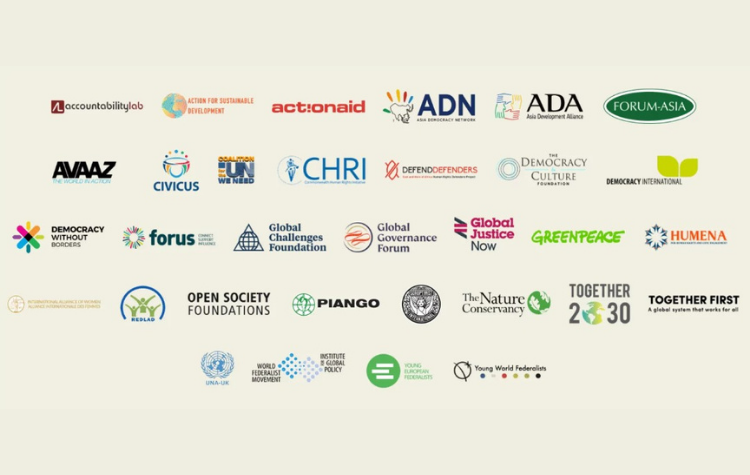On the occasion of the International Day for Multilateralism and Diplomacy for Peace on 24 April, a group of over 100 civil society organisations calls for a more inclusive and democratic UN. The Asian Forum for Human Rights and Development (FORUM-ASIA) is among those who have endorsed a joint statement “for more inclusive global governance”.
Under the header “We the Peoples,” a reference to the first words of the United Nations Charter Preamble, this new campaign is calling on the UN to implement three specific reforms aimed at giving people, elected representatives and civil society a stronger voice in global governance.
The statement first calls for a World Citizens’ Initiative which enables citizens to put items on the agenda of the UN General Assembly or the UN Security Council if proposals reach a certain threshold of popular support.
Further, the campaign promotes the creation of a UN Parliamentary Assembly composed of elected representatives to act as a watchdog and “connecting the people with the UN and reflecting a broad diversity of global viewpoints”.
Finally, the document recommends setting up a UN Civil Society Envoy “to champion the implementation of a broader strategy for opening up the UN to people’s participation and civil society voices”.
The campaign is spearheaded by CIVICUS: World Alliance for Citizen Participation, Democracy International and Democracy Without Borders.
The document points out that the proposed changes “will enhance the legitimacy of global governance and facilitate its transformational potential”.
“These three initiatives have game changing potential to overcome blockages in the UN system. If implemented in earnest they will enable the UN to respond more effectively and with greater inclusivity to global challenges such as discrimination, inequality, conflict and climate change.” explained Lysa John, Secretary-General of CIVICUS.
“Strengthening and revitalizing multilateralism requires to allow for more input and participation beyond member states. This is what our three proposals will achieve”, said Andreas Bummel, Executive Director of Democracy Without Borders.
A resolution adopted by the UN-General Assembly on the occasion of the UN’s 75th anniversary in 2020 tasked UN Secretary-General Antonio Guterres to compile a report on furthering a “common agenda” which includes upgrading the UN and boosting partnerships.
“It is of the utmost importance that we use this opportunity to make the UN fit-for-purpose. We are calling on UN Secretary-General Guterres to usher the UN into a new, more participatory era,” said Bruno Kaufmann, Board Member of Democracy International.
The statement and the list of signatories is published at wethepeoples.org.
– ENDS –
Annex
In 2020, the UN celebrated its 75th anniversary. To take stock of the UN’s accomplishments and challenges for the future, UN Secretary-General Guterres, who is searching re-election this year, organised a yearlong series of consultations. 1.5 million people participated in surveys and dialogues that were summarised in the UN75 report.
One thing that stands out is that while an overwhelming majority of people (97%) see the work of the UN as indispensable, four out of ten also reported that they felt that the UN was remote from their lives. This is a clear sign that the citizens of the world believe in the UN’s mission, but need it to be more transparent, accountable and participatory.
In recent years multilateralism has come under attack, diminished funding and an unparalleled backslide into autocratisation around the world is threatening the system of global cooperation and partnership that was built in the aftermath of the second World War, we have to act now and set a clear signal that this cynical retreat into self-interest does not serve citizens around the globe. The only way forward is to work together.
At the 2020 UN General Assembly, the Member States tasked UN Secretary-General Antonio Guterres to compile a report with proposals for UN reform. He will present his report at the General Assembly this year in September, under the header “Our Common Agenda”.
On this day of International Multilateralism, in the midst of a global pandemic, it is all the more clear that good global governance is more important than ever. The highest global governing body, the UN, must therefore adopt the aims that would make the UN more democratic, more inclusive, and more closely representative to the regular people.
***
The Asian Forum for Human Rights and Development (FORUM-ASIA) is a regional network of 81 member organisations across 21 Asian countries, with consultative status with the United Nations Economic and Social Council, and consultative relationship with the ASEAN Intergovernmental Commission on Human Rights. Founded in 1991, FORUM-ASIA works to strengthen movements for human rights and sustainable development through research, advocacy, capacity-development and solidarity actions in Asia and beyond. It has sub-regional offices in Geneva, Jakarta, and Kathmandu. www.forum-asia.org
For a PDF version of this statement, please click here
For further information, please contact:
- UN Advocacy Programme, FORUM-ASIA,[email protected]
For media inquiries, please contact:
- Melissa Ananthraj, Communication and Media Programme, FORUM-ASIA [email protected].



